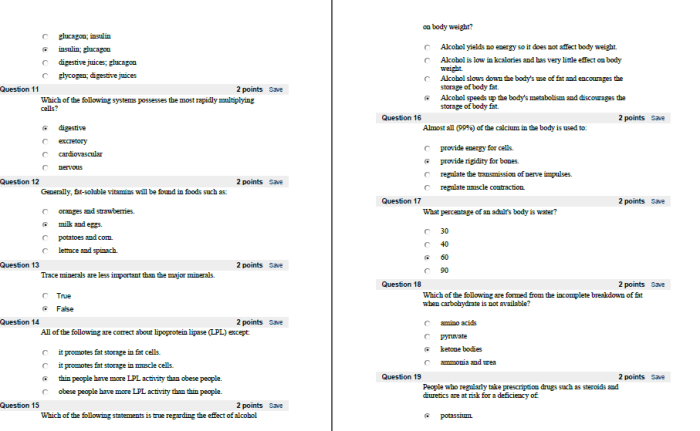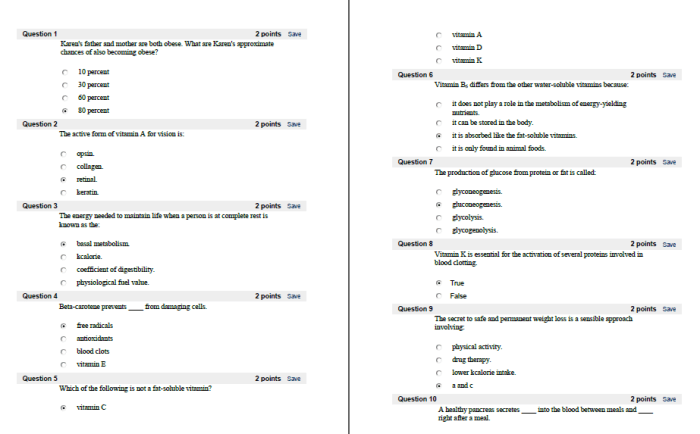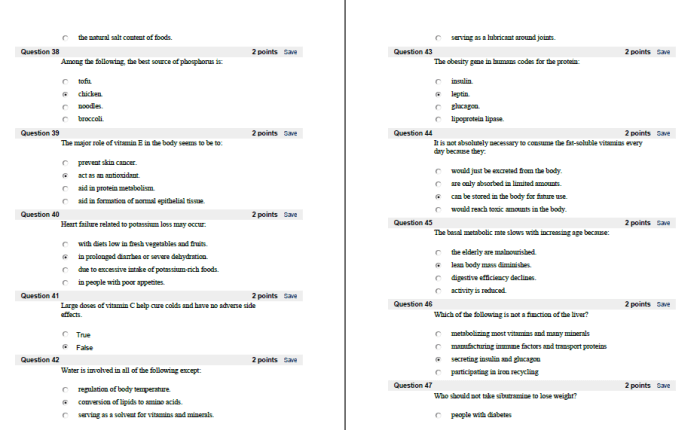Embarking on a journey through the realm of nutrition, this guide, “Nutrition Final Exam Questions and Answers PDF,” stands as a beacon of knowledge, illuminating the path to exam success and beyond. Within its pages, you will discover a wealth of essential information, empowering you to confidently tackle any nutrition exam and enhance your understanding of this vital field.
Delving into the intricacies of nutrition, this comprehensive resource encompasses the fundamental concepts, assessment and planning strategies, interventions, health promotion initiatives, research methodologies, and ethical considerations that shape the practice of nutrition. Prepare to immerse yourself in a world of essential nutrients, macronutrients, micronutrients, vitamins, minerals, and their profound impact on human health.
Nutrition Concepts

Nutrition encompasses the study of nutrients and their impact on health and well-being. Understanding essential nutrients, macronutrients, micronutrients, vitamins, and minerals is crucial for maintaining optimal bodily functions.
Macronutrients, including carbohydrates, proteins, and fats, provide energy and serve as building blocks for various bodily structures. Micronutrients, such as vitamins and minerals, are required in smaller amounts but play vital roles in metabolic processes, immune function, and overall health.
Essential Nutrients and Their Functions
- Carbohydrates: Primary energy source for the body, especially for the brain and muscles.
- Proteins: Building blocks for muscles, tissues, and enzymes; involved in hormone production and immune function.
- Fats: Energy storage, hormone production, and cell membrane formation.
- Vitamins: Organic compounds essential for various metabolic processes, such as vitamin C for immune function and vitamin D for bone health.
- Minerals: Inorganic elements required for body functions, including calcium for bone health and iron for oxygen transport.
Nutrition Assessment and Planning

Nutrition assessment involves gathering information about an individual’s nutritional status and dietary habits to identify potential risks and develop personalized nutrition plans.
Steps in Nutrition Assessment
- Medical history review: Identifying any underlying health conditions or medications that may impact nutritional needs.
- Anthropometric measurements: Assessing body mass index (BMI), body composition, and other physical parameters.
- Dietary intake analysis: Evaluating food consumption patterns and nutrient intake through methods like food diaries or recalls.
- Biochemical tests: Measuring blood or urine levels of nutrients or biomarkers to assess nutritional status.
Calculating Energy and Nutrient Requirements
Individual energy and nutrient requirements vary based on age, gender, activity level, and health status. Various equations and guidelines are used to calculate these requirements, considering factors such as basal metabolic rate (BMR) and physical activity level.
Sample Nutrition Care Plan
A nutrition care plan Artikels specific dietary recommendations and interventions tailored to an individual’s nutritional needs. It may include:
- Calorie and macronutrient distribution
- Food group recommendations
- Supplementation recommendations
- Dietary modifications for specific health conditions
Nutrition Interventions: Nutrition Final Exam Questions And Answers Pdf
Nutrition interventions aim to improve nutritional status, prevent or manage diseases, and promote overall health and well-being.
Principles of Nutrition Counseling and Education
- Patient-centered approach: Tailoring interventions to individual needs and preferences.
- Evidence-based practice: Utilizing scientifically supported nutrition recommendations.
- Motivational interviewing: Encouraging behavior change through empathy and non-judgmental support.
Role of Nutrition in Disease Management
Proper nutrition plays a crucial role in managing chronic diseases such as diabetes, cardiovascular disease, and obesity. Dietary modifications, including reducing saturated fat intake or increasing fiber consumption, can help improve disease outcomes.
Nutrition Interventions for Health Conditions
- Diabetes: Meal planning, carbohydrate counting, and monitoring blood sugar levels.
- Cardiovascular disease: Reducing saturated and trans fats, increasing fruits and vegetables, and maintaining a healthy weight.
- Obesity: Creating calorie deficits through dietary changes, increasing physical activity, and promoting behavior modification.
Nutrition and Health Promotion
Promoting healthy nutrition is essential for preventing chronic diseases and maintaining optimal health throughout the lifespan.
Link between Nutrition and Chronic Diseases
Poor nutrition, including excessive consumption of processed foods, sugary drinks, and unhealthy fats, is a major risk factor for chronic diseases such as heart disease, stroke, and type 2 diabetes.
Importance of Healthy Eating Habits
Adopting healthy eating habits, including consuming fruits, vegetables, whole grains, and lean protein, can reduce the risk of chronic diseases and promote overall well-being.
Strategies for Promoting Healthy Nutrition
- Nutrition education campaigns: Raising awareness about the importance of healthy eating and providing practical guidance.
- School-based nutrition programs: Teaching children about healthy food choices and promoting healthy eating habits.
- Community initiatives: Establishing farmers’ markets, community gardens, and cooking classes to increase access to and knowledge of healthy foods.
Nutrition Research and Evidence-Based Practice
Nutrition research is essential for advancing our understanding of the role of nutrition in health and disease and informing evidence-based practice.
Methods Used in Nutrition Research
- Observational studies: Examining associations between dietary factors and health outcomes.
- Intervention studies: Testing the effects of specific dietary interventions on health parameters.
- Meta-analyses: Combining results from multiple studies to provide a more comprehensive analysis.
Importance of Evidence-Based Practice
Evidence-based practice in nutrition involves using scientifically supported recommendations to guide dietary interventions. This approach ensures that nutrition recommendations are based on the best available evidence and lead to optimal health outcomes.
Influence of Research Findings on Nutrition Recommendations
Research findings have significantly influenced nutrition recommendations over time. For example, research linking saturated fat intake to cardiovascular disease risk led to dietary guidelines emphasizing the importance of reducing saturated fat consumption.
Ethical Considerations in Nutrition

Ethical principles guide nutrition practice to ensure that interventions are conducted in a responsible and respectful manner.
Ethical Principles
- Autonomy: Respecting an individual’s right to make informed decisions about their nutrition.
- Beneficence: Promoting the well-being and health of individuals.
- Non-maleficence: Avoiding harm or potential risks in nutrition interventions.
- Justice: Ensuring equitable access to nutrition resources and interventions.
Ethical Implications of Nutrition Interventions
Nutrition interventions may raise ethical concerns, such as:
- Informed consent: Ensuring that individuals understand and agree to nutrition interventions.
- Conflicts of interest: Avoiding conflicts between financial interests and nutrition recommendations.
- Cultural sensitivity: Respecting cultural and religious dietary practices.
Ethical Dilemmas in Nutrition, Nutrition final exam questions and answers pdf
Ethical dilemmas in nutrition may include:
- Providing nutrition support to individuals with eating disorders.
- Balancing the risks and benefits of nutritional supplements.
- Addressing nutrition-related health disparities in underserved populations.
FAQ Overview
What is the importance of macronutrients in nutrition?
Macronutrients, including carbohydrates, proteins, and fats, provide the body with energy and the building blocks for growth and repair.
How can I calculate my daily energy requirements?
Energy requirements vary based on factors such as age, weight, height, and activity level. Various equations and online calculators can assist in estimating individual needs.
What are the ethical considerations in nutrition counseling?
Nutrition counselors must adhere to ethical principles such as confidentiality, informed consent, non-discrimination, and cultural sensitivity to ensure the well-being and autonomy of their clients.